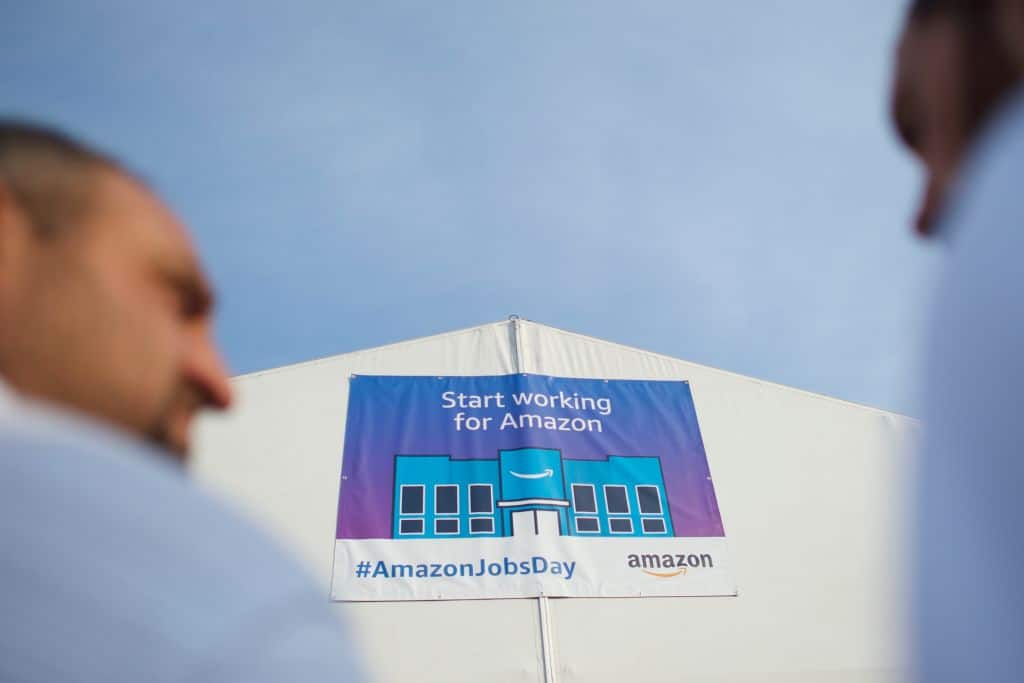In this issue
- Bitcoin: Amazon delivers a denial
- Robinhood IPO: Look under the hood
- Huobi: Bye-bye, Beijing
From the Editor’s Desk
Dear Reader,
For most cryptocurrency enthusiasts — although not certain purists — widespread adoption of cryptos is something of a Holy Grail.
Like the coveted cup, it has proven elusive.
But the industry seemed to inch forward this week, with Bitcoin surging (before dropping back) on reports that retailer Amazon was planning to accept it for payment. Amazon was at pains to deny hatching any such plan, but the idea is now in the wind, and, given the flip-flops of companies such as Tesla when it comes to taking the token, adoption by the world’s biggest e-tailer certainly cannot be ruled out.
This week was also one in which Robinhood, a major equity trading platform, described crypto as central to its success as it prepared for a US$35 billion initial public offering. Adoption doesn’t come much clearer than that. By any logic, a bet that big ought to make people sit up and pay attention.
As the crypto conversation turns once again — and as it inevitably and constantly does — to adoption, it may be that Amazon is merely awaiting action and Robinhood is right. And if they are, their cup may runneth over.
Until the next time,
Angie Lau,
Founder and Editor-in-Chief
Forkast.News
1. Buying into Bitcoin: Doth Amazon protest too much?

By the numbers: Amazon denies crypto — over 5,000% increase in Google search volume
Amazon has denied reports suggesting that it is planning to accept Bitcoin as payment by the end of the year. “Notwithstanding our interest in the space, the speculation that has ensued around our specific plans for cryptocurrencies is not true,” an Amazon spokesperson told AFP. “We remain focused on exploring what this could look like for customers shopping on Amazon.”
- On July 22, Amazon posted a job opening for a “digital currency and blockchain product lead” for its payment acceptance and experience team. The product lead would “develop Amazon’s digital currency and blockchain strategy and product roadmap.” The job required expertise in blockchain, distributed ledgers, central bank digital currencies and cryptocurrencies.
- According to a job post in early June, Amazon was searching for a blockchain head of product with expertise in decentralized finance. The ad said: “Ideally you will have experience delivering products or innovations in the blockchain space, and in particular DeFi or traditional financial services.” Amazon Web Services, Amazon’s cloud business, started to offer a managed blockchain service as long ago as 2019. Its users include Nestlé and AT&T.
Forkast.Insights | What does it mean?
Bitcoin surged by almost 15% following a report by London’s City A.M. newspaper on Monday that claimed an Amazon “insider” had said the e-commerce giant would begin to accept Bitcoin payments by the end of the year.
Following Amazon’s denial of the report, Bitcoin began giving up some of the day’s gains, falling from nearly US$40,000 to around $37,112.
Despite Amazon pouring cold water on the source’s claims of BTC payments by year’s end — and Bitcoin’s reactive price rally — a company spokesperson said: “We remain focused on exploring what this could look like for customers shopping on Amazon.”
But given the job advertisement, the source may have been onto something. So why would Amazon deny the claim?
Two possible reasons spring to mind. First, Amazon may simply be exploring the options. Second, the company wants more time to accumulate Bitcoin reserves before sending the token’s price skyward with an official announcement.
A growing number of companies have started moving toward accepting cryptocurrencies as payment, bringing the asset class — largely shunned by traditional finance businesses until recent months — closer to the mainstream. But as the cryptocurrency markets tend to become overheated amid frenzied fear of missing out, corporate announcements have often led to sharp price surges.
When Tesla announced on Feb. 8 that it had purchased US$1.5 billion of Bitcoin and planned to accept BTC payments, the price of the coin skyrocketed, rising from $39,000 to $44,290 — a record at the time. Tesla’s announcement came in February, but there was evidence that a market player had been buying large amounts of Bitcoin since the end of December, a week after MicroStrategy CEO Michael Saylor offered to share his Bitcoin buying playbook with Tesla CEO Elon Musk.
Bitcoin was trading at around US$24,000 in December, during the exchange between Saylor and Musk, and had the Tesla founder formally announced his plans to buy the crypto, its price would have leapt before he had the opportunity to put his plan into action.
Given Amazon’s suspected interest in crypto, its related job openings and the growing trend toward accepting Bitcoin as payment, it seems reasonable to assume that the e-commerce giant might want to keep its plans under wraps until it has built up a stash of Bitcoin.

2. Robinhood’s IPO: Look under the hood

By the numbers: Robinhood — 4,450% increase in Google search volume
Robinhood Markets is expected to hold an initial public offering on July 29. The trading platform will list its shares on Nasdaq under the ticker “HOOD” at an estimated price of US$38 to US$42 per share, targeting a valuation of US$35 billion. Robinhood users can request shares of the company by using the app’s IPO Access feature, through which they can confirm or decline orders after official pricing. Among the 55 million shares on offer, up to 35% will be reserved for retail investors.
- As per its S-1 application with the U.S. Securities and Exchange Commission, Robinhood has around 18 million active clients monthly, with an overall client asset base of $80 billion, up from 11.7 million users last year and 4.3 million in 2019. The company is expected to record 21.3 million active users for Q2 2021.
- Robinhood’s mobile app has gained popularity during Covid lockdowns, with more than 3 million new users signing up in the first four months of 2020 alone.
- During the company’s roadshow last Saturday, CEO Vlad Tenev said crypto was a lynchpin of the retail investment app’s future, and that a crypto wallet could be in the works. He also said Robinhood was considering launching U.S. retirement accounts.
- Robinhood also disclosed an investigation request from the Financial Industry Regulatory Authority, an industry self-regulatory body, relating to the “non-registration status” of Tenev and his co-founder, Baiju Bhatt.
Forkast.Insights | What does it mean?
Robinhood’s IPO is perhaps one of the most hotly anticipated of 2021, but the trading platform is mired in controversy involving its business practices and is dealing with numerous legal issues. Although Robinhood is large and growing rapidly, many aspects of its operations may raise concerns for investors looking to participate in Thursday’s share sale.
Robinhood claims that its mission is to “democratize finance for all” and make it easier for retail investors to trade stocks and other assets, according to its S-1 filing. The platform is a free-trading app that lets investors trade stocks, options, exchange-traded funds and cryptocurrencies without paying commissions or fees.
Since Robinhood doesn’t charge commissions, potential investors need to ask how it makes its money. The answer to that question sheds light on one of the biggest risks to investors and potential legal issues that could pose a significant threat to the company’s valuation.
Robinhood makes money by receiving “payments for order flow” from other brokers for executing requested trades in a particular way. Simply put, PFOF is controversial and represents a conflict of interest. It can cause orders that are executable not to be executed because they are routed to market makers that make the biggest payments. PFOF therefore discourages brokers such as Robinhood from obtaining the best trades for their customers and runs counter to the company’s mission statement. The practice is already banned in the U.K. and Canada, and there is an ongoing discussion in the U.S about whether the government could make it and similar practices illegal, or at least more rigorously regulated.
This is a serious problem for Robinhood’s valuation, because the company has revealed that 81% of its revenue comes from either PFOF or rebates received from cryptocurrency trading, which are also attracting close regulatory scrutiny.
But what about Robinhood’s astonishing growth, you ask? Well, although it’s true that Robinhood’s accounts are in good shape as far as tech IPOs go, much of their shine may be attributable to the unprecedented circumstances to which Covid-19 gave rise. The company was a big winner amid the pandemic as bored individuals receiving government cheques decided to play the stock market using its platform. Its revenue leapt from US$127 million in Q1 2020 to US$522 million Q1 2021, a fourfold increase. Robinhood reported a net profit of nearly US$7.5 million for the 2020-21 fiscal year.
So far, so good, but those numbers are completely eclipsed by Robinhood’s loss of $1.4 billion during the first three months of this year. The company chalked up that loss to a “change in value of convertible notes and warrant liability,” but what we suspect it actually means is that it had to scramble to secure emergency funding during the GameStop incident, which increased volatility.
In sum, investors looking to take part in Robinhood’s IPO should be aware that the company’s valuation could plummet in the event of a crackdown on PFOF. There are also additional problems with Robinhood’s business, such as whether retail investors in the U.S., who are no longer in lockdown, will continue to play the stock market, particularly amid rising interest rates. The usual caveats apply: Do your homework and invest with caution.
3. Huobi bows out of Beijing

Huobi, one of the world’s largest cryptocurrency exchanges by trading volume, is deregistering a business unit in Beijing, according to a notice from China’s national enterprise credit information publicity system.
- Beijing Huobi Network Technology, registered in December 2013, sent a de-registration application to local officials on July 22. Huobi Chairman Li Lin is set to act as the manager in charge of the closure of the Beijing unit, in which public records show Li holds a 70.5% stake.
- In reply to a request for comment by Forkast.News, Huobi said the unit was registered in the early stages of the company’s development, and because it was not conducting any business operations, it was unnecessary to keep it running.
- Huobi is not the first crypto exchange to cancel its registration in China. Beijing Lekuda Network Technology, a unit of crypto exchange OKEx, applied to de-register last month.
Forkast.Insights | What does it mean?
Huobi’s shuttering of its Beijing unit prompted a 22% plunge in the price of Huobi Technology’s Hong Kong-listed stock yesterday.
No reason has been given for the closure of Beijing Huobi Network Technology beyond a Huobi Global spokesperson’s email to Forkast.News saying it was merely a matter of closing down an irrelevant office. “This entity has not had any business operations, it is unnecessary and [Huobi] has applied for cancellation,” the email said.
However, Huobi’s move comes less than a month after Beijing Lekuda, founded by OK Group’s Star Xu in 2012 to operate Huobi’s then-rival exchange, OKCoin, also filed for dissolution.
Although Huobi’s crypto exchange business was originally based in China, it moved out of the country years ago, as did OKEx, meaning that neither unit’s closure should affect their crypto trading operations. But the decision by both firms to dissolve units in China altogether comes at a time when Beijing is ramping up its crackdown on both crypto trading and mining.
We reached out to three industry sources in China, but all were unwilling to comment on the matter, saying it was “sensitive.”
Even though there may be more to the story, given the proximate timing of the closures, it may be the case that following regulatory scrutiny, both Huobi and OKEx are simply trying to underline the fact that they have officially ended all crypto trading in China.



